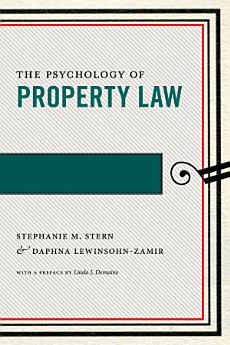The Psychology of Property Law
Stephanie M. Stern · Daphna Lewinsohn-Zamir
Feb 2020 · Psychology and the Law Book 3 · NYU Press
Ebook
303
Pages
family_home
Eligible
info
reportRatings and reviews aren’t verified Learn More
About this ebook
Considers how research in psychology offers new perspectives on property law, and suggests avenues of reform
Property law governs the acquisition, use and transfer of resources. It resolves competing claims to property, provides legal rules for transactions, affords protection to property from interference by the state, and determines remedies for injury to property rights. In seeking to accomplish these goals, the law of property is concerned with human cognition and behavior. How do we allocate property, both initially and over time, and what factors determine the perceived fairness of those distributions? What social and psychological forces underlie determinations that certain uses of property are reasonable? What remedies do property owners prefer?
The Psychology of Property Law explains how assumptions about human judgement, decision-making and behavior have shaped different property rules and examines to what extent these assumptions are supported by the research. Employing key findings from psychology, the book considers whether property law’s goals could be achieved more successfully with different rules. In addition, the book highlights property laws and conflicts that offer productive areas for further behaviorally-informed research.
The book critically addresses several topics from property law for which psychology has a great deal to contribute. These include ownership and possession, legal protections for residential and personal property, takings of property by the state, redistribution through property law, real estate transactions, discrimination in housing and land use, and remedies for injury to property.
Property law governs the acquisition, use and transfer of resources. It resolves competing claims to property, provides legal rules for transactions, affords protection to property from interference by the state, and determines remedies for injury to property rights. In seeking to accomplish these goals, the law of property is concerned with human cognition and behavior. How do we allocate property, both initially and over time, and what factors determine the perceived fairness of those distributions? What social and psychological forces underlie determinations that certain uses of property are reasonable? What remedies do property owners prefer?
The Psychology of Property Law explains how assumptions about human judgement, decision-making and behavior have shaped different property rules and examines to what extent these assumptions are supported by the research. Employing key findings from psychology, the book considers whether property law’s goals could be achieved more successfully with different rules. In addition, the book highlights property laws and conflicts that offer productive areas for further behaviorally-informed research.
The book critically addresses several topics from property law for which psychology has a great deal to contribute. These include ownership and possession, legal protections for residential and personal property, takings of property by the state, redistribution through property law, real estate transactions, discrimination in housing and land use, and remedies for injury to property.
About the author
Stephanie M. Stern (Author)
Stephanie M. Stern is Professor of Law at Chicago-Kent College of Law, Illinois Institute of Technology.
Daphna Lewinsohn-Zamir (Author)
Daphna Lewinsohn-Zamir is Dean and Louis Marshall Professor of Environmental Law at the Hebrew University of Jerusalem.
Stephanie M. Stern is Professor of Law at Chicago-Kent College of Law, Illinois Institute of Technology.
Daphna Lewinsohn-Zamir (Author)
Daphna Lewinsohn-Zamir is Dean and Louis Marshall Professor of Environmental Law at the Hebrew University of Jerusalem.
Rate this ebook
Tell us what you think.
Reading information
Smartphones and tablets
Install the Google Play Books app for Android and iPad/iPhone. It syncs automatically with your account and allows you to read online or offline wherever you are.
Laptops and computers
You can listen to audiobooks purchased on Google Play using your computer's web browser.
eReaders and other devices
To read on e-ink devices like Kobo eReaders, you'll need to download a file and transfer it to your device. Follow the detailed Help Center instructions to transfer the files to supported eReaders.




